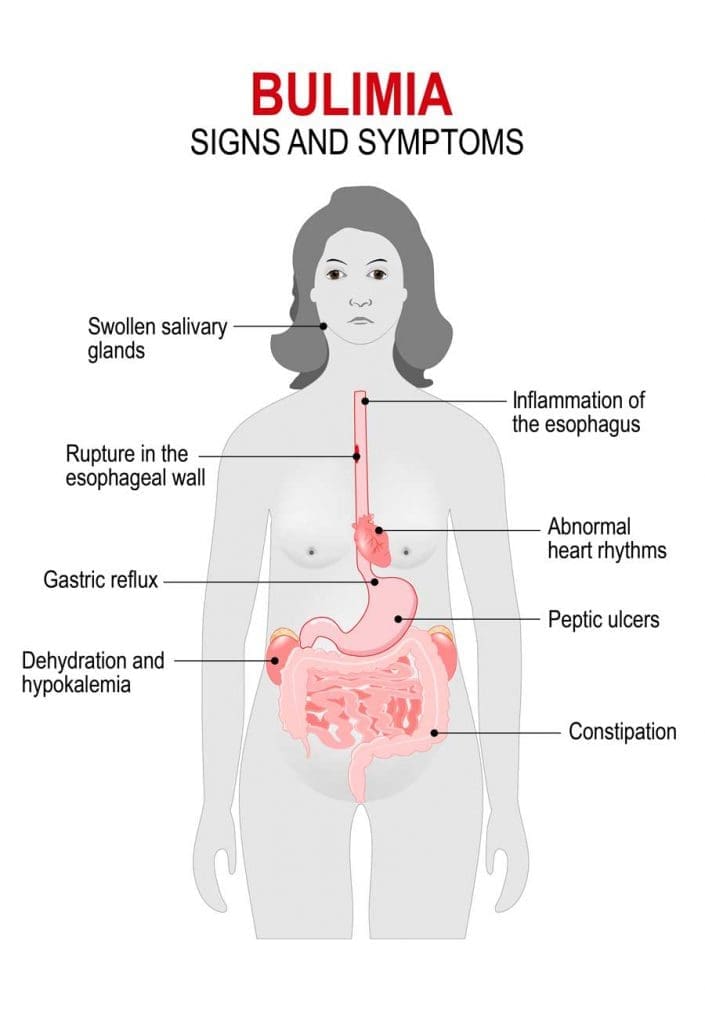Two prominent addictions that frequently kill are alcohol and food. When these two addictions meet, the negative effects of both are amplified and the prognosis is poor unless the correct treatment is undertaken.

In this article we look at the reasons why alcohol and eating disorders, bulimia in particular, are so deadly when combined. We also advise on where to get help if you or a loved one are a sufferer.
What is Bulimia?
Bulimia nervosa is a chronic mental health illness where the affected individual will follow a binge and purge routine in order to avoid weight gain/lose weight. Those that suffer from bulimia tend to be of average weight and so the illness is less obvious to others than anorexia (severely underweight) or compulsive overeating (severely overweight).
A bulimic’s actions around food will often be ritualistic and compulsive. They may use one particular method of purging or a combination of methods. Purging always follows a binge on food, where they will consume vast amounts of usually highly calorific food within one sitting.
Following a food binge, a bulimic will either induce vomiting or use laxatives, diuretics, excessive exercise or a period of fasting to counteract the high intake of calories. In many cases of bulimia nervosa, the sufferer will use a combination of purge methods for maximum effect.

Bulimia nervosa is a very serious condition that can cause permanent and even fatal organ damage. An individual diagnosed with bulimia will also suffer mentally, socially, occupationally and often financially as a direct result of their illnesses. This deadly illness is one of the most common eating disorders in women and often cooccurs alongside alcohol use disorders (AUD’s)
Alcoholism and bulimia can often go hand in hand
Studies conducted among women seeking treatment for alcohol use disorders have reported a high incidence of bulimia as a dual diagnosis, with a staggering 30 to 50% of female alcoholics also suffering from bulimia. In those seeking treatment for bulimia, 20 to 25% of females were found to also suffer from an alcohol use disorder (1)
These facts are of utmost importance, especially in the treatment field. Sadly many women who undergo treatment for alcoholism do not admit to their bulimia and therefore are not comprehensively treated.
The result of treating one disorder but not the other is nearly always a relapse. This is due to the fact that the two illnesses, when combined, become part of the same compulsive and ritualistic behaviour. In essence, they greatly enable one another.
So why is it that bulimia is so often undetected?
The nature of bulimia is very secretive, with the sufferer often feeling overwhelming feelings of shame and guilt around their actions. This is further compounded by a false belief system that is deeply ingrained and considered to be delusional.
Someone suffering from bulimia cannot rationalise that eating a normal healthy diet will enable a stable and healthy BMI. Even when they can rationalise this on some level, they are unable to sustain it due to the compulsive overeating and purging that characterises this illness. This is the crux of the problem, unless a bulimic’s thinking can be completely transformed there is very little hope of recovery.
Fearing loss of control when the control is already lost
A bulimics worst fear is loss of control around their food intake and uncontrollable weight gain as a result. A bulimia sufferer is unable to see that every time they binge and purge they are far from in control.
Bulimia is a highly stressful, all consuming condition that lends to very high levels of anxiety. The constant purging causes severe chemical imbalances in the brain. These imbalances cause a bulimic to suffer very unpleasant side effects, such as insomnia, agitation, obsessive thought patterns and anxiety. This is where alcohol can become a bulimic’s solution and best friend!
Alcohol has a relaxing effect and can calm a stressed and anxious mind (albeit very temporarily). As an addictive substance, someone predisposed to addiction and already suffering a fragile mind set, can easily abuse alcohol to the point where it then becomes an equal part of the problem.
When alcohol and bulimia coexist, the sufferer finds relief in alcohol; whether that be to help them relax or drinking to the point of oblivion where their bulimia no longer prevails their every thought. Without alcohol, their bulimic condition would be even more intolerable.
Similarly, someone with an alcohol use disorder may turn to bulimia as a method of weight management. Alcohol can act as an appetite stimulant and this combined with reduced inhibitions could cause a person predisposed to binge and purge on food. Those who are alcohol dependent will usually find that they can only eat if they have sufficient alcohol in their system.
This is why, when alcoholism and bulimia co occur, treating them both comprehensively and ideally simultaneously is absolutely vital.

Call us confidentially at any time to speak to a member of our team.
Call us now: 0330 111 2015
The effects of co occurring bulimia and alcoholism
Suffering from both bulimia and alcoholism comes with a whole host of serious physical and behavioural implications. Both conditions alter brain chemistry and have grave effects on the body’s electrolyte balance.
Together, these conditions magnify the negative effects of each individual illness, putting the sufferer at greater risk of physical complications, psychiatric illness and death.
Physical risks of co occurring bulimia and alcoholism include:
- Dental decay
- Fainting
- Heart arrhythmia
- Heart palpitations
- Heart disease
- Heart attack
- Malnutrition
- Organ failure
- Impaired memory and cognitive ability
- Insomnia
- Liver disease
- Esophageal rupture
- Stomach ulcers and bleeds
- Intestinal damage
- Coma
- Death
Mental health risks of co occurring bulimia and alcoholism include:
- Higher levels of anxiety and depression.
- Increased likelihood of hospitalisation for mental health problems
- Increased likelihood of exhibiting suicidal behavior and self harm tendencies.
- Impaired function and ability on a social, cognitive, occupational and interpersonal level (2)
Other risk factors associated with dual diagnosis bulimia and alcoholism
In addition to the considerable physical, mental and social health risks that bulimia and alcoholism combined bring, it has also been found that women suffering from both conditions have a higher incidence of suffering from other common co occurring disorders.
Various studies have found that women suffering from both an alcohol use disorder and bulimia are more likely to:
- Suffer from other serious psychiatric disorders including: body dysmorphic disorder (BDD), major depressive disorders and post traumatic stress disorder (PTSD)
- Be diagnosed with a Cluster B personality disorder including Borderline Personality Disorder (BPD)
- Be more prone to relapse than if suffered from only one of either conditions
- Deteriorate faster from binge or habitual drinking into full blown alcohol dependence and addiction
- Experience problems in relationships and at work
- Suffer from malnourishment as a result of the two illnesses depleting vital vitamins and minerals within the body
- Die from medical complications or psychiatric complications (2,3)
Treatment for bulimia and alcohol
At Delamere we recognise that substance abuse disorders can commonly co exist with serious psychiatric conditions such as bulimia and other eating disorders. It is for this very reason that our treatment programmes are ultra personalised to incorporate treatment for all disorders presenting within our guests.
Our distinguished team of counsellors, consultant psychiatrist, doctors, qualified nursing staff and therapists are very experienced when it comes to comprehensively treating our dual diagnosis guests. We understand the importance of leaving no stone left unturned during the treatment process and will do everything we can to ensure that each of our guests undergoes comprehensive healing and a complete transformation.

If you or a loved one are suffering from bulimia and alcoholism, please do not delay treatment. This is one particularly deadly combination of mental health conditions that need to be treated simultaneously and comprehensively in order for recovery to be possible.
Our purpose built addiction treatment and behavioural wellness clinic, Delamere rehab in Cheshire, is a first class facility, well equipped to treat complex cases.
We pride ourselves on our unique and innovative treatment programmes. Our programmes are designed to treat every aspect of each of our guests and provide them with the tools they need for continued recovery back in the community and family environment.
We use evidence based treatments to target and heal the core issues and causes of each illness. We combine our therapies with professional medical care, mental health treatment and a full holistic healing programme.
To find out more about our eating disorder and alcohol treatment programmes call and speak with one of our friendly addiction experts today
References:
- Fouladi F, Mitchell JE, Crosby RD, et al. Prevalence of Alcohol and Other Substance Use in Patients with Eating Disorders. Eur Eat Disord Rev. 2015;23(6):531-536.
- Dansky BS, Brewerton TD, Kilpatrick DG. Comorbidity of bulimia nervosa and alcohol use disorders: results from the National Women’s Study. Int J Eat Disord. 2000;27(2):180-190.
- Sinha R, O’Malley SS. Alcohol and eating disorders: implications for alcohol treatment and health services research. Alcohol Clin Exp Res. 2000;24(8):1312-1319.

Call us confidentially at any time to speak to a member of our team.
Call us now: 0330 111 2015






